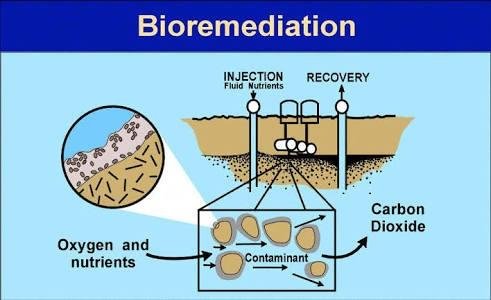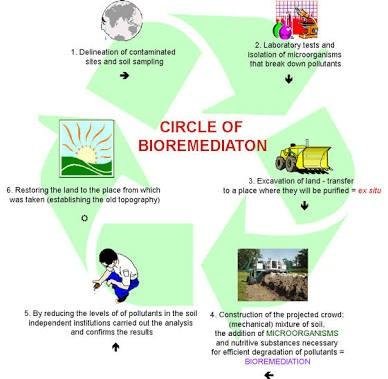What Did You Know About Bioremediation
Bioremediation
Chemical contamination in an ecosystem can cause death to some or all living organisms in the ecosystem. Generally, a community can survive because of its metabolism diversity. When microbes change toxin or other ecologically dangerous substances into molecules that are no longer dangerous, the purification process is called Bioremediation.

Bioremediation is a process used to treat contaminated media, including water, soil and subsurface material, by altering environmental conditions to stimulate growth of microorganisms and degrade the target pollutants. Source
Microbial bioremediation enables us to solve many population problems in a simple way by letting organisms to digest organic and no-organic pollutant. In many cases we can use the process to help us solve pollution problem.
The organic substance provides energy and carbon
The organic substance provides energy and ncarbon for bioremediation microbes to grow and clean the environment. A simulation of micro flora from that ecosystem shows the success of cleaning chemical contaminant. Purification needs adjustment in pH level or oxygen which is contained in water or soil.
A lot of compounds cannot be quickly digested by soil and water microbes. Solvent, cooler, actuators, fire extinguisher, pesticide, remain undigested in the environment. The resistance of those poisonous compounds leads to a big danger, so that we need to consider the limitation of using those compounds. DDT pesticide is one clear example of forbidden products because its toxin still remains in the environment.
Pesticides and chemical substances
Most pesticides and other chemical substances which are released into the environment have given selective pressure for a relatively long time. This makes microorganisms able to digest a little part of the components. But, pollutant digestion is very slow to be effective. Scientists search for organisms that can digest pollutant faster and more efficiently. They also look for organisms that can digest substances which are difficult to be naturally decomposed by microbe.

Pesticides are substances that are meant to control pests (including weeds). The term pesticide includes all of the following: herbicide, insecticides (which may include insect growth regulators, termiticides, etc.) nematicide, molluscicide, piscicide, avicide, rodenticide, bactericide, insect repellent, animal repellent, antimicrobial, fungicide, disinfectant (antimicrobial), and sanitizer. Source
Microbes are also a key to develop a new kind of pesticide that can be decomposed in the environment. Non toxic, now bacteria and viruses have been used to kill plant pathogenic insect. This is called Biocontrole.
You might think that all bacteria are dangerous. Think again, some bacteria work to clean the pollution that we have done to our environment, oil spill. In 1989, Exxon Valdez, a ship was taking petroleum to the south from the pipe lane of Alaska. When the ship hit the ground, there was a hole on its side and millions of gallons of oil spread out along Alaska coast. In some places, the oil even soaked into the beach two feet deep. It seemed there was no way out to clean the spilled oil. The scientists decided to identify help that might come from bacteria which live in the shore.
Those scientists knew that some bacteria can naturally decompose hydrocarbon, a kind of important molecule found in oil and they also knew that the bacteria lives in Alaska. The problem was there are not enough bacteria to handle all spilled oil. To make the bacteria multiply themselves rapidly, the scientists changed phenol into safe salts.
Soil is not the only suitable place to test bioremediation. Bacteria have been used in waste recycling center to clean water. When we burn coal that contains sulphur, the sulphur is released into the air and creates acid rain. Bacteria that can digest sulphur are used to clean coal before being widely used, so that it will be environment friendly.
Sources :
How-microbes-clean-up-oil-spills
Thank you for very informative post! Having natural organisms clean up our pollution would be a very smart way to tackle all those toxins. Still, I agree with you - reducing the production of those chemicals should be first priority :)
Thanks...